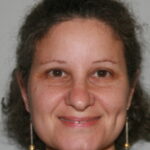Current Team Members
Prof Simon Parsons
Deleted: 
Simon Parsons is a Professor of AI and Machine Learning at the University of Lincoln. He received his PhD from University of London in 1993, and held academic positions at Queen Mary and Westfield College, Massachusetts Institute of Technology, City University of New York, University of Liverpool and King’s College London before joining Lincoln. Simon’s research interests centre on autonomous systems, in particular coordination and decision-making, and he has published over 350 papers and written or edited 11 books on these topics. He is co-Editor of Knowledge Engineering Review, and an Editorial Board member for the journals Robotics and Argument & Computation.
Prof Elizabeth Sklar

Prof Elizabeth Sklar is a Professor of Agri-Robotics and Research Director in the Lincoln Agri-Robotics centre at the University of Lincoln, within the Lincoln Institute for Agri-Food Technology. She is also Professor of Robotics (part-time) in the Department of Engineering at King’s College London. She received her PhD from Brandeis University (US) in 2000 and subsequently has held academic positions at Columbia University (US), the City University of New York (US) and the University of Liverpool (UK). She is a former US-UK Fulbright Scholar (2013-14). Dr Sklar’s research interests include human/multi-robot interaction, data-backed decision making and behaviour mining. While in the US, her work was largely funded by the National Science Foundation. She has published over 150 papers in refereed journals, conferences and workshops and has edited two books. She is a founding chair of RoboCupJunior, on the Editorial Board for the Journal of Autonomous Agents and MultiAgent Systems and former member of the Board of Directors for the International Foundation for Autonomous Agents and Multiagent Systems (IFAAMAS) and former Trustee of the RoboCup Federation.
Dr Ionut Moraru

Ionut (Yani) is a Post Doctoral Research Associate in Explainable AI at University of Lincoln.
Dr Federico Castagna

Federico Castagna is a Post Doctoral Research Associate in Explainable AI at University of Lincoln. His PhD studies in Informatics at King’s College London were preceded by a Bachelor’s degree in Philosophy and a Master’s degree in Philosophical Sciences at the University of Milan. His research interests include Computational Argumentation, Proof theories and Explainable AI. Federico is also co-founder and co-editor of the OHAAI project (Online Handbook of Argumentation for AI). Currently, the focus of his work involves improving the reliability of AI-driven decision-support systems by enhancing their explainability using argumentation.
Dr Zhuoling Huang

Zhuoling Huang is a Post Doctoral Research Associate in Human-Robot Interaction at University of Lincoln.
Previous Team Members

Dr Vasa Curcin is a Reader in Health Informatics at King’s College London and leads the Health Informatics Group, focusing on phenomics, Learning Health Systems, machine learning, and research reproducibility solutions based on data provenance. He did his PhD on semantics of scientific workflow systems, the application of his thesis to large real-world patient databases resulted in one of the earliest workflow-based phenotyping tools that has been used in both academic and industrial settings. He is the KCL lead for Health Data Research UK network’s Phenomics and Trials themes, co-lead of the Data Analytics cluster in the Guy’s and St. Thomas’s NIHR Biomedical Research Centre, and a director of the DRIVE-Health Centre for Doctoral Training in Data-Driven Health.
Dr Mark Ashworth

Mark Ashworth has been a GP in south London for 30 years and is Reader in Primary Care at the School of Population Health and Environmental Sciences based on the Guy’s Hospital campus of King’s College London.
His research interests include quality measurement in primary care (with a particular interest in the Quality and Outcomes Framework, a quality based incentive scheme in primary care), psychometrics (with a particular interest in patient-centred mental health outcome measures – his group devised PSYCHLOPS: www.psychlops.org.uk) and the physical health of patients with mental health conditions (he has led on the research linkage of primary care data with secondary care mental health data).
Dr Ellen Wright

Dr Ellen Wright has been a GP in Greenwich for 25 years and a Clinical Academic Fellow in the Department of Primary Care, School of Population Health and Environmental Sciences, at Kings College since 2010. She has published papers on bisphosphonates and upper GI cancer, referral management in general practice, diagnostic decision support and chronic pain management. Since 2015 she has also been the Primary Care Specialty Group Lead for South London CRN, supporting research delivery in general practice.
Dr Panos Balatsoukas

Panos is a Lecturer in Experience Design in the Design School of Loughborough University; and a Visiting Lecturer in the Department of Population Health Sciences of King’s College London. His research is focused on improving user experiences and interactions with digital health information systems and applications as well as understanding the behavioural and cognitive factors influencing human interaction with digital health information and eHealth interventions in the context of modern data-driven societies. Before joining the CONSULT project, Panos was a postdoctoral researcher at the prestigious Farr Institute for Health Informatics Research (@HeRC) of the University of Manchester.
Mr Archie Drake

Archie Drake is a Research Associate interested in the machinery of government. He currently works part time with the Department of Informatics on policy dimensions of Artificial Intelligence research. He previously worked at the Policy Institute on an ESRC project, in partnership with the London Ambulance Service, to explore the impact of new and emerging data sources on emergency response. Archie has held roles with the Cabinet Office, the Ministry of Justice and the London Borough of Haringey. Before his return to the UK in 2015, he managed international development projects in conflict-affected states. Archie holds a Master’s in Public Administration from Harvard University’s Kennedy School of Public Administration and an MA in History from the University of Cambridge. He is also a qualified solicitor.
Dr Martin Chapman

Martin Chapman is a Research Associate in the School of Population Health and Environmental Sciences at King’s College London. He also works with the Department of Informatics at King’s College London. His research interests include computational modelling and simulation, search games and distributed ledger technologies. His current focus is on implementing software to gather patient data from disparate sources (e.g. wellness sensors and EHRs) for the purpose of making and explaining decisions in the context of healthcare. Martin received a Ph.D. in Computer Science from King’s College London.
Dr Nadin Kokciyan

Nadin is a Lecturer in Artificial Intelligence in the School of Informatics at University of Edinburgh; and a Visiting Research Fellow in the Department of Informatics at King’s College London. Her research interests include multi-agent systems, computational argumentation and privacy in social software. She received her PhD from Bogazici University in 2017, and held a postdoc position at King’s College London prior to joining University of Edinburgh. Nadin regularly serves on the program committees for leading AI conferences such as AAMAS, IJCAI, AAAI and ECAI.
Dr Isabel Sassoon

Isabel is a Lecturer in Computer Science at Brunel University London; and a Visiting Researcher in the Department of Informatics at King’s College London. Isabel’s research interests are in data-driven automated reasoning, and its transparency and explainability. Her PhD research developed a computational argumentation based system to support the appropriate selection of statistical model given a research objective and available data.
Prior to joining King’s College London Isabel worked for more than 10 years as a data science consultant in industry, including 8 years in SAS. Isabel read Statistics, Operations Research and Economics at Tel Aviv University and received her Ph.D. in Informatics from King’s College London. Isabel regularly serves on program committees for AI and Health Informatics conferences such as IJCAI, ECAI and AMIA.
Dr Matthew Story

Matthew Story is a Post Doctoral Research Associate in Human-Robot Interaction at University of Lincoln.
Dr Sanjay Modgil

Dr Sanjay Modgil is a Reader in Artificial Intelligence and head of the Reasoning and Planning Group, Department of Informatics, King’s College London. He formerly held the chair of the European Association of Multiagent Systems and is on the editorial board of Argument and Computation. His main area of research is in the development of logic-based models of argumentation for rational reasoning and decision making, and on formalising models of dialogue in which rational conclusions are arrived at through the dialectical exchange of argument and counter-argument. He has extensively applied his models to reasoning and decision making in the medical domain.
Dr Talya Porat

Talya is a Lecturer in Human Factors at the Dyson School of Design Engineering, Imperial College London. Her research is in the fields of human factors, human-computer interaction, usability and cognitive engineering. She is particularly interested in decision-making processes and how to design and evaluate effective interactive healthcare interventions to improve patient outcomes and reduce medical errors. She is a visiting lecturer in the Department of Population Health Sciences at King’s College London.
Dr Peter Young

Peter is a visiting postdoctoral researcher at the Department of Informatics at King’s College London and a data scientist at Accuity, a RegTech company. His research interests are in argumentation theory, in particular its relationship and applications to medical decision support systems, non-classical logics, game theory, evaluating online debates and multi-lingual entity resolution. Peter read mathematical physics at Imperial College London and mathematical logic at the University of Manchester. Before joining industry, he completed a PhD in computer science and two postdoctoral positions at King’s College London.
